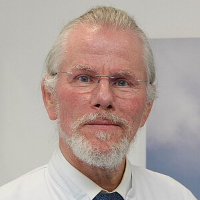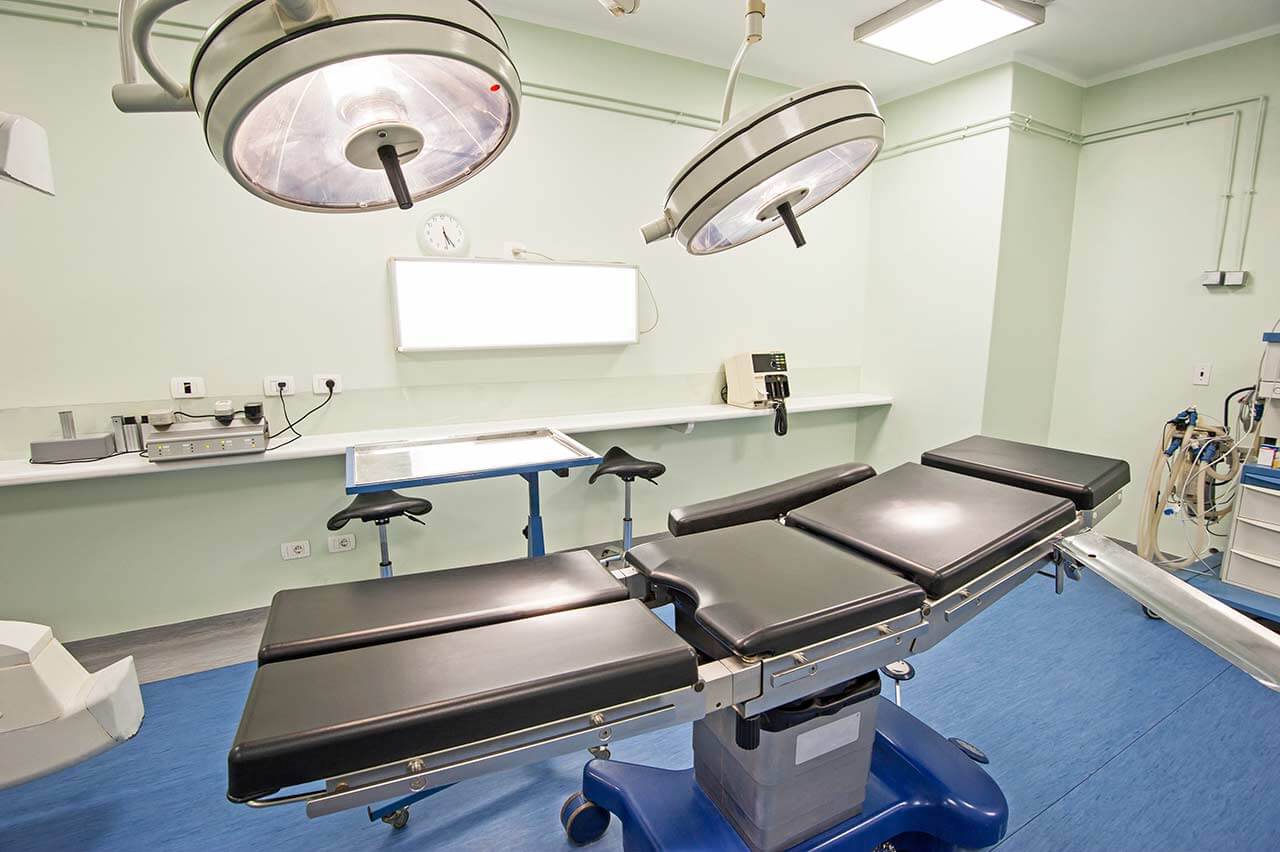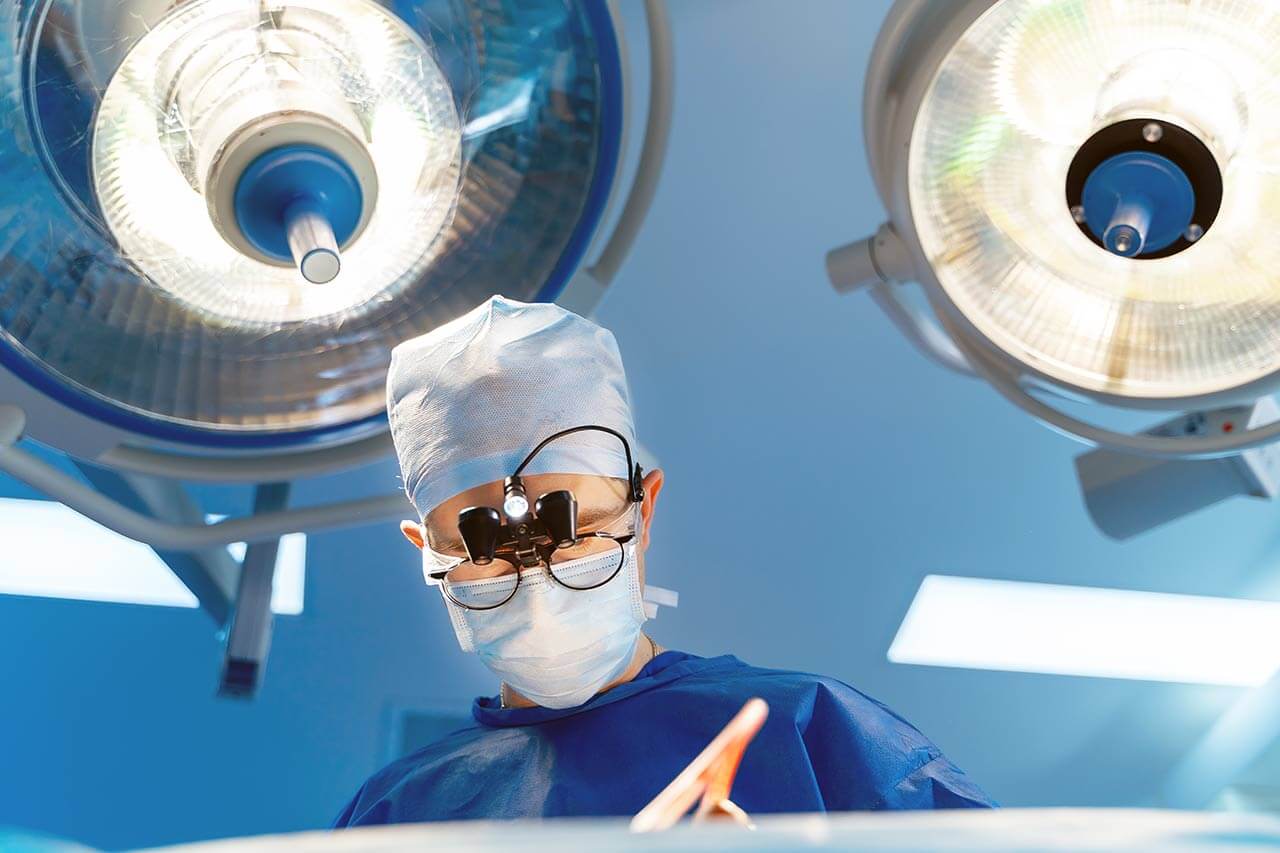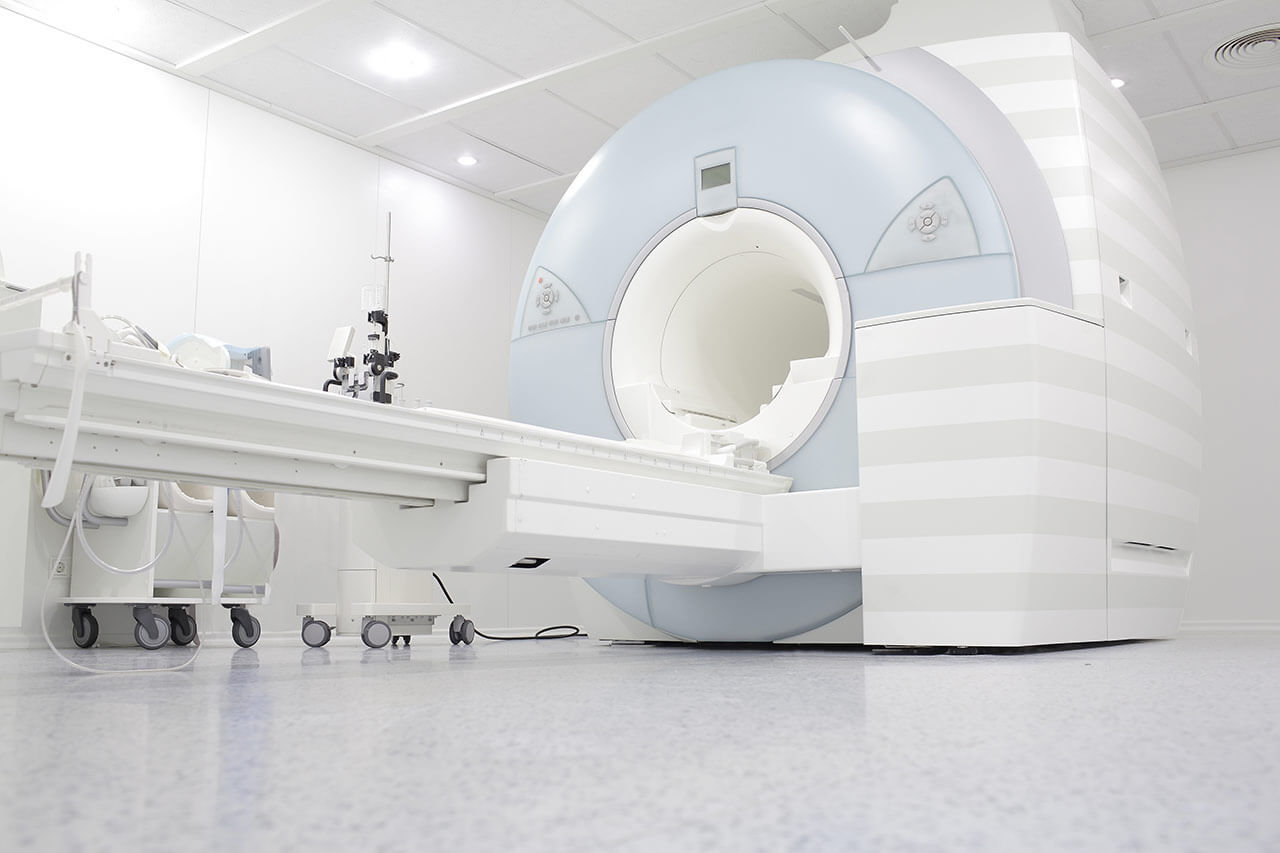
The program includes:
- Initial presentation in the clinic
- clinical history taking
- review of medical records
- physical examination
- laboratory tests:
- complete blood count
- general urine analysis
- biochemical analysis of blood
- inflammation indicators (CRP, ESR)
- indicators blood coagulation
- neurological examination
- CT/MRI scan
- neuropsychological tests (on indications):
- ENMG (electroneuromyography)
- EEG (electroencephalography)
- SEPs (somatosensory evoked potentials)
- VEPs (visually evoked potentials)
- BAEP tests (brainstem auditory evoked potential)
- preoperative care
- neuronavigation-assisted surgical removal
(resection) of spinal astrocytoma - histologically and immunohistochemically
examination of the remote tissues - blood transfusions (if needed)
- 1-day intensive care unit stay
- symptomatic treatment
- control examinations
- the cost of essential medicines and materials
- nursing services
- full hospital accommodation
- explanation of future recommendations
Required documents
- Medical records
- MRI/CT scan (not older than 3 months)
- Biopsy results (if available)
Service
You may also book:
 BookingHealth Price from:
BookingHealth Price from:
About the department
The Department of Adult and Pediatric Spinal Surgery at the Vitos Orthopedic Clinic Kassel specializes in the treatment of the full range of cervical, thoracic, and lumbar spine diseases. Doctors pay special attention to providing medical care to patients with herniated discs, spinal instability, vertebral fractures, spinal stenosis, spinal deformities, and spinal tumors. The department has at its disposal all modern types of conservative and surgical treatment for spinal pathologies. Spinal surgery is a last-line treatment and is indicated only when conservative methods have failed. Most surgical interventions for spinal diseases and deformities are performed in the department using minimally invasive techniques. Since 2021, the advanced robotic surgical system Globus Excelsius GPS has also been available in the department's operating room. The American-made robotic device is specially designed for spinal surgery. This system provides high efficiency and safety for surgical manipulations. The doctors at the medical facility also carry out interventional treatment for chronic back pain under imaging guidance when an anesthetic is injected into the pathological focus under X-ray or CT guidance. The department's specialists thus have at their disposal all the necessary resources for effective treatment.
The Head Physician of the department is Dr. med. Rafael Sambale. The doctor has already performed more than 10,000 operations, and all of them had a successful outcome with a minimum percentage of complications. According to the Focus magazine, the doctor ranks among the top doctors in Germany specializing in the treatment of spinal diseases!
Spinal diseases are often associated with severe pain. First of all, the department's doctors use the most effective conservative methods, including medicines, physiotherapy, and occupational therapy. In some cases, aids such as a corset, a belt, or a bandage may be helpful. These are designed and manufactured in the department in accordance with the patient's measurements and functional requirements. Interventional pain relief procedures are also performed in the department. The essence of these procedures is the targeted injection of an anesthetic drug into the affected area under X-ray or CT guidance. Interventional treatment provides good results and is highly safe. If conservative treatment options are exhausted, the department's specialists resort to surgical interventions.
The department's specialists have rich experience in the treatment of chronic back pain. Patients with pain syndrome suffer not only physically but also psychologically. Pain rules their lives. In such cases, physicians provide multimodal pain management while patients are examined and treated using an interdisciplinary approach. Treatment tactics are determined with the participation of pain management specialists, anesthesiologists, psychotherapists, physiotherapists, neurologists, osteopaths, and caregivers. Multimodal pain management can take place in a hospital or on an outpatient basis, depending on the complexity of the clinical case. During the treatment of chronic back pain, the department's doctors use drug therapy, physiotherapy, acupuncture, cognitive behavioral therapy, biofeedback, relaxation techniques, qigong exercises, tai chi, neural therapy, and other methods.
In complex clinical cases, the department's doctors resort to surgery for spinal diseases. The department's surgeons have an excellent command of minimally invasive techniques, which are often used for operations on the intervertebral discs and stabilization surgery. The department also performs extensive surgical interventions aimed at restoring the mobility of the spine, for example, prosthetic intervertebral disc replacement and dynamic stabilization. Rigid spinal stabilization is also within the scope of the tasks of the department's doctors and is recommended for such diseases as vertebral fractures, spondylolisthesis, spinal tumors, and spinal inflammatory diseases.
The department performs safe interventions for posture correction, for example, in patients with kyphosis and scoliosis, as well as destructive processes, for example, inflammation, tumors, or deformities after vertebral fractures. Revision interventions after unsuccessful spinal surgery are another focus of the department's work. Such surgical procedures are complex tasks that require a lot of experience, careful planning, and preparation from the operating surgeon, up to the manufacture of special implants.
The department's special offer in the field of spinal surgery is an operation using a computer-assisted robotic device called Globus Excelsius GPS. This American technology has been used in the department since 2021. Robot-assisted interventions using this surgical device are performed for pathological lesions of the cervical, thoracic, and lumbar spine, which require the implantation of a screw and rod stabilization system. Such systems are most often placed for patients with spinal instability due to vertebral degeneration, fractures, tumors, or displacement. Robot-assisted surgical interventions are also often performed for sacral fractures in older people suffering from osteoporosis. The main advantage of the Globus Excelsius GPS robot is the highest accuracy and safety of the operation. At the stage of preoperative preparation, a CT scan of the spine is done, after which the surgical robotic device analyzes the images and determines the optimal trajectory for implanting screws to stabilize the spine. During robot-assisted spinal surgery, it is enough for a doctor to make small skin and soft tissue incisions, which contributes to the absence of pain in the postoperative period. It should be noted that all surgical manipulations are performed by the surgeon, and the robotic system only provides imaging of the optimal trajectory for inserting screws into the spine and their position.
The department's therapeutic options include the following:
- Conservative treatment
- Drug therapy with oral medications
- Physiotherapy
- Occupational therapy
- Pain management with X-ray or CT-guided injections
- Therapy with aids (corsets, belts, and bandages), also in children
- Multimodal pain management
- Drug therapy: oral medications and injections of painkillers under X-ray or CT guidance
- Physiotherapy
- Acupuncture
- Cognitive behavioral therapy
- Biofeedback
- Relaxation techniques
- Qigong gymnastics
- Tai chi
- Neural therapy
- Surgical treatment
- Prosthetic intervertebral disc replacement surgery
- Spinal stabilization surgery, including using the Globus Excelsius GPS robot-assisted system
- Decompression surgery for spinal stenosis
- Spinal fusion
- Surgery to correct spinal deformities, including the correction of scoliosis and kyphosis in children
- Treatment of vertebral fractures
- Treatment of spinal tumors
- Revision spinal surgery in cases of ineffective previous treatment
- Other medical services
Curriculum vitae
Dr. med. Rafael Sambale studied Human Medicine at the Universities of Mainz and Marburg. This was followed by the work of Assistant Physician at the hospitals in Marburg, Melsungen, Bad Wildungen, and Minden Westfalen. From 1995 to 2000, he worked at the Werner Wicker Clinic Bad Wildungen and also held the position of Managing Senior Physician at the Auguste Victoria Hospital Bad Oeynhausen (focusing on spinal surgery). In July 2000, he held the position of Head Physician in the Department of Spinal Surgery at the Orthopedic Clinic Hessisch Lichtenau. Since November 1, 2015, he has been heading the Department of Adult and Pediatric Spinal Surgery at the Vitos Orthopedic Clinic Kassel.
According to the Focus magazine, Dr. Sambale has been ranked among the top specialists in spinal surgery for many years. He also has a Master Certificate from the Commission for Continuing Education of the German Society for Spine Surgery (DWG). This is the largest specialized society for treating spinal diseases in Europe. In 2023, the doctor received the Stern Сertificate as an outstanding specialist in spinal surgery.
Additional Qualifications
- Chiropractic.
- Physiotherapy.
- Special pain management.
- Emergency medical care.
- Theoretical basis of the specialty in radiation protection during computed tomography in adults and children.
Admission to Conduct Advanced Training Courses
- Orthopedics and traumatology.
- Special pain management.
Memberships in Professional Societies
- German Trauma Society.
- German Society for Orthopedics and Trauma Surgery.
- German Speaking Medical Society for Paraplegia.
- German Society for Spinal Surgery.
- Professional Association of Orthopedists and Traumatologists.
- Association of Managing Senior Physicians at German Hospitals.
- Interdisciplinary Medical Society of Kassel.
Photo of the doctor: (c) Vitos Orthopädische Klinik Kassel
About hospital
The Vitos Orthopedic Clinic Kassel is a specialized medical facility where patients can receive top-class diagnostics and conservative and surgical treatment for musculoskeletal diseases, including spinal pathologies. The clinic was founded more than 100 years ago, so it is proud of its rich and successful clinical experience and also honors its long traditions. Before the clinic first opened its doors to patients, its building was a sanatorium and health complex that provided medical care to the wounded during the First World War. Today, the clinic enjoys a reputation as one of the best orthopedic centers in Germany and Europe. 164 beds are available for patients' hospital stays. In June 2021, a new clinic building was put into operation, so now patients are accommodated in comfortable rooms that correspond to the level of a high-class hotel.
The clinic annually admits about 5,000 inpatients for diagnostics and treatment, and more than 17,000 patients receive medical care on an outpatient basis. The health of patients is in the safe hands of a medical team of more than 330 employees, including specially trained nursing staff. All specialists at the medical facility strive to provide the most effective and, at the same time, sparing treatment. Doctors always devote enough time to personal communication with the patient. They talk about possible treatment options and expected therapeutic results, and they answer the patient's questions. Particular attention is paid to supporting the patient during treatment because a positive attitude plays an important role in the success of therapy.
The clinic's team of orthopedists has exceptional professional skills in surgical treatment. The specialists have at their disposal five high-tech operating rooms, in which they annually perform more than 4,500 operations of varying complexity. In addition, the clinic's doctors have a perfect command of the latest conservative treatments, which, in some cases, may help avoid a surgical procedure. In October 2020, a specialized department was opened in the clinic, which provides pain management, manual therapy, and naturopathic treatment. The clinic also treats young patients with musculoskeletal diseases.
The Vitos Orthopedic Clinic Kassel has all the necessary technical and human resources available to provide top-class treatment for common and rare cases of orthopedic pathology. The medical facility has modern diagnostic rooms, operating rooms with special equipment for arthroscopic and minimally invasive operations, and treatment rooms for manual therapy. The head physicians of the clinic's departments are included in the ratings of top specialists in their areas of competence according to the prestigious medical magazine Focus, so patients can be sure that they trust their health to true professionals in their field.
Photo: (с) depositphotos
Accommodation in hospital
Patients rooms
The patients of the Vitos Orthopedic Clinic Kassel live in comfortable single and double rooms with a modern design. Each patient room has an ensuite bathroom with a shower and a toilet. The furnishings of a standard patient room include an automatically adjustable bed, a bedside table, a wardrobe for storing clothes and personal belongings, and a table and chairs for receiving visitors.
If desired, patients can be accommodated in single enhanced comfort rooms. These rooms are more spacious and have an exquisite design, corresponding to the level of an upscale hotel.
Meals and Menus
The patients of the clinic are offered tasty and healthy meals three times a day: buffet breakfast, lunch, and dinner. If necessary, the patients can be offered either a dietary or individual menu.
Further details
Standard rooms include:
Religion
On the first floor of the clinic, there is a prayer room where patients can stay alone to pray at any time of the day. Catholic services are also held in the prayer room once every two weeks.
Accompanying person
Your accompanying person may stay with you in your patient room or at the hotel of your choice during the inpatient program.
Hotel
You may stay at the hotel of your choice during the outpatient program. Our managers will support you for selecting the best option.





